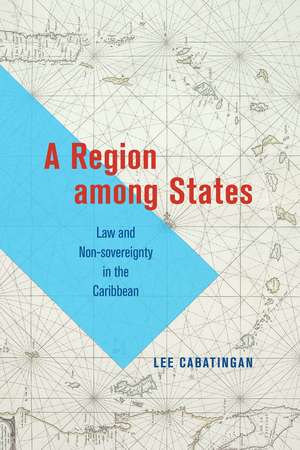A Region among States: Law and Non-sovereignty in the Caribbean
Autor Lee Cabatinganen Limba Engleză Paperback – 5 iun 2023
How is it that a great swath of the independent, English-speaking Caribbean continues to accept the judicial oversight of their former colonizer via the British institution of the Privy Council? And what possibilities might the Caribbean Court of Justice—a judicial institution responsive to the region, not to any single nation—offer for untangling sovereignty and regionhood, law and modernity, and postcolonial Caribbean identity?
Joining the Court as an intern, Lee Cabatingan studied its work up close: she attended each court hearing and numerous staff meetings, served on committees, assisted with the organization of conferences, and helped prepare speeches and presentations for the judges. She now offers insight into not only how the Court positions itself vis-à-vis the Caribbean region and the world but also whether the Court—and, perhaps, the region itself as an overarching construct—might ever achieve a real measure of popular success. In their quest for an accepting, eager constituency, the Court is undertaking a project of extrajudicial region building that borrows from the toolbox of the nation-state. In each chapter, Cabatingan takes us into an analytical dimension familiar from studies of nation and state building—myth, territory, people, language, and brand—to help us understand not only the Court and its ambitions but also the regionalist project, beset as it is with false starts and disappointments, as a potential alternative to the sovereign state.
| Toate formatele și edițiile | Preț | Express |
|---|---|---|
| Paperback (1) | 198.95 lei 3-5 săpt. | +11.01 lei 6-10 zile |
| University of Chicago Press – 5 iun 2023 | 198.95 lei 3-5 săpt. | +11.01 lei 6-10 zile |
| Hardback (1) | 563.45 lei 3-5 săpt. | +19.26 lei 6-10 zile |
| University of Chicago Press – 4 iun 2023 | 563.45 lei 3-5 săpt. | +19.26 lei 6-10 zile |
Preț: 198.95 lei
Nou
Puncte Express: 298
Preț estimativ în valută:
38.07€ • 38.99$ • 31.67£
38.07€ • 38.99$ • 31.67£
Carte disponibilă
Livrare economică 26 februarie-12 martie
Livrare express 11-15 februarie pentru 21.00 lei
Preluare comenzi: 021 569.72.76
Specificații
ISBN-13: 9780226825618
ISBN-10: 0226825612
Pagini: 240
Ilustrații: 5 color plates, 10 halftones, 1 tables
Dimensiuni: 140 x 216 x 15 mm
Greutate: 0.29 kg
Ediția:First Edition
Editura: University of Chicago Press
Colecția University of Chicago Press
ISBN-10: 0226825612
Pagini: 240
Ilustrații: 5 color plates, 10 halftones, 1 tables
Dimensiuni: 140 x 216 x 15 mm
Greutate: 0.29 kg
Ediția:First Edition
Editura: University of Chicago Press
Colecția University of Chicago Press
Notă biografică
Lee Cabatingan is assistant professor of criminology, law, and society and anthropology at the University of California, Irvine. She is also an attorney licensed in the United States. She is coeditor of Global Perspectives on the Rule of Law.
Cuprins
Orientation: The Caribbean Court of Justice
1 Introduction
2 A Myth
3 A Territory
4 A People
5 A Language
6 A Brand
7 A Region
Acknowledgments
Appendix: Methods and Positionality
Notes
References
Index
1 Introduction
2 A Myth
3 A Territory
4 A People
5 A Language
6 A Brand
7 A Region
Acknowledgments
Appendix: Methods and Positionality
Notes
References
Index
Recenzii
“This is an empathetic and rigorous anthropology of the CCJ. Sharply constructed and with flowing writing, Cabatingan’s ethnography brings together questions and approaches from postcolonial regionalism, legal anthropology, and Caribbean studies. Through eye-opening conversations with judges and throughout the court, interwoven with a careful study of media and archival material, she shows how the delicate balance between the work of adjudication and of political region making raises dilemmas that otherwise remain right below the surface.”
“This fascinating study of the CCJ deftly mines the peripheries of the court’s work to show successfully how the court uses and reimagines the tools of statecraft in its central effort of promoting a region. The book’s rich analysis of the array of activities of and feelings about the CCJ is a great contribution to what we know about the complex work of new apex courts and scholarly debates about region-making projects in the Caribbean.”
